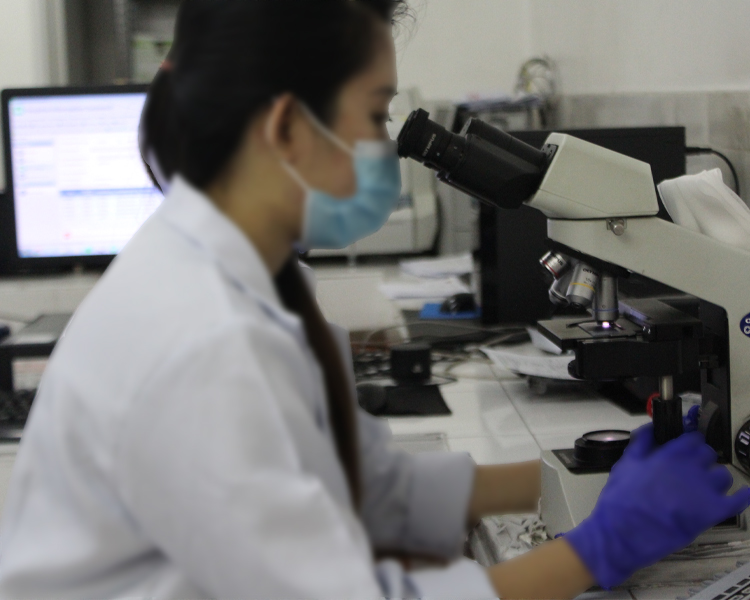LABORATORY
The laboratory work that goes into the study of blood is frequently performed by medical technologists. Their routine work mainly includes whole blood analysis through use of hematology analyzers equipped with modern technology. In addition, viewing of blood films and bone marrow slides under the microscope, interpreting various hematological test results and blood clotting test results are also routinely done in this section.
Hematology
Hematology, is the branch of laboratory medicine concerned with the study, diagnosis, treatment, and prevention of diseases related to the blood. This includes the study of blood cells and its components, such as hemoglobin, and other blood proteins. This laboratory science also involves treatment of diseases that affect blood cell production as well as the mechanism of coagulation.
Clinical Chemistry
Clinical chemistry, also known as chemical pathology, clinical biochemistry or medical biochemistry is the area of laboratory medicine that is generally concerned with the chemical analysis of physiologically important substances present in the human body.
This section demonstrates the presence of enzymes and hormones in serum, urine and other body fluids that may determine pathological conditions through laboratory tests performed in state-of the-art chemistry analyzers.
Clinical Microscopy
Clinical Microscopy is the branch of laboratory medicine that deals with the physical, chemical and microscopic examination of urine, stool and other body fluids.
This section of the laboratory routinely performs urinalysis – the physical, chemical, and microscopic examination of urine which involves number of tests to detect and measure various compounds that pass through the urine.
In addition, the section also performs fecalysis – the physical and microscopic examination of stool which identifies presence of medically significant microorganisms that confirms diagnosis of parasitism.
Immunology—Serology
Serology is the branch of laboratory medicine that involves scientific study and analysis of plasma serum and other bodily fluids. In clinical laboratory practice, the term usually refers to the diagnostic identification of antibodies in the serum. Such antibodies are typically formed in response to an infection.
Clinical microbiology deals with the interrelation of macro- and microorganisms under normal and pathological conditions and in the dynamics of a pathological process with an account of the treatment till the clinical and/or complete recovery is presented.
Immunohematology/Blood Bank
Immunohematology, more commonly known as blood banking is the branch of laboratory medicine which studies antigen-antibody reactions and analogous antigen-antibody reactions and analogous phenomena as they relate to the pathogenesis and clinical manifestations of blood disorders.
The blood bank is where blood units and other blood products are processed and distributed for transfusion. Medical technologists perform blood bank procedures such as: blood typing, blood crossmatching and antibody identification necessary to guarantee safe blood transfusion practices.
Histopathology
Histopathology is the branch of laboratory medicine which refers to the microscopic examination of tissues in order to study the manifestations of diseases. Specifically, in clinical medicine, histopathology refers to the examination of a biopsy or surgical specimen by a pathologist, after the specimen has been processed and histological sections have been placed onto glass slides.
- Complete Blood Count (CBC)
- Reticulocyte Count
- Peripheral Blood Smear (PBS)
- Malarial Smear
- Erythrocyte Sedimentation (ESR)
- Bleeding Time
- Clotting Time
- Coagulation Tests
- Prothrombin Time (PT)
- Activated Partial Thromboplastin Time (APTT)
- Lipid Profile
- Total Cholesterol
- (HDL, LDL, VLDL)
- Triglycerides
- Liver Profile
- SGPT/ALT
- SGOT/AST
- ALP
- GGT
- Total Bilirubin (Direct Bilirubin
- Glucose
- Fasting Blood Sugar
- Random Blood Sugar
- OGTT (50g, 75g, 100g)
- Electrolytes
- BUN
- Creatinine
- Urinalysis
- Fecalysis
- Fecal Occult Blood Test
- Sperm Analysis/Semenalysis
- Cell Count of Body Fluids
- Pregnancy Test
- Gram Stain
- AFB Stain
- KOH Smear
- Blood
- Urine
- Stool
- Other Body Fluids
- ABO/Rh Typing (Blood Typing)
- Blood Crossmatching
- Direct Antihuman globulin (AHG)/Direct Coombs
- Indirect Antihuman globulin (AHG)/Indirect Coombs
- Papanicolau’s Smear (Pap Smear)
- Tissue Biopsy
- Cytology
- Cell Block
- Frozen Section
- Immunohistostain




